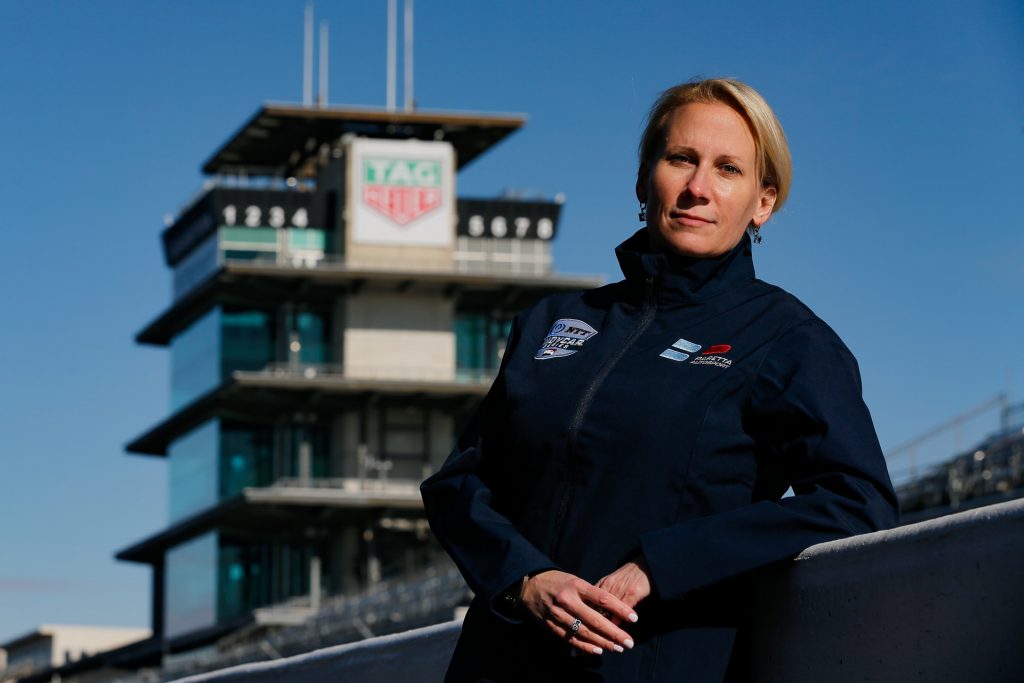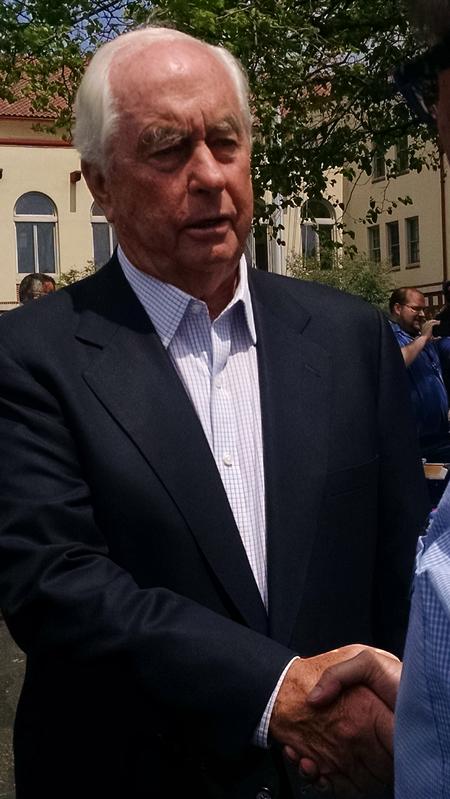Detroit-Based Majority-Women Race Car Team Drives Toward Historic Qualifying at Indy 500
IndyCar team owner Beth Paretta makes history this weekend during qualifying for the Indianapolis 500. In what’s been a male-centric sport, Paretta is fielding the first IndyCar team whose members are almost all women.

Beth Paretta has been involved in motor sports for years.
She had an idea that an all-women’s IndyCar team competing at the biggest race in the world could be a winner in more ways than just earning a visit to Victory Lane.
“So I think that was the moment where, OK, you have somebody that is not only a mentor of yours, has the wherewithal and has the interest to help [but will also] allow you to look at their playbook. That’s when I thought, ‘This is gonna work.’” –Beth Paretta, on working with Team Penske
Paretta reasoned the team would be a natural seller to the sponsors who provide racing’s lifeblood.
And it could also use racing as a real-world example of why young women should embrace STEM classes in school.
Paretta almost made her dream team a reality a half-dozen years ago, until technical problems left her with a car that would have been significantly slower than the rest of the field.
That wouldn’t do for a debut, she said, in part because a team made up mostly of women would be a magnet for unfounded criticism based on gender.
Go too slow, she feared, and some would say it was because women racers simply couldn’t be as good as men.
But Paretta says she knew that was a lie. She kept the wheels in motion for an all-women’s team, saying the old kind of motor sports misogyny seemed to be rapidly dissipating.
Then legendary auto racer Roger Penske took over both the IndyCar series and the Indianapolis Motor Speedway.
Last summer Penske launched an initiative to diversify a sport that was long the domain of mostly white males. And Paretta saw her chance to bring her dream to Indy’s starting line.
Listen: Beth Paretta discusses her journey to field an all-women’s team for the Indy 500 and what it means for the future of auto sports.
WDET’s Quinn Klinefelter spoke with Beth Paretta. Read excerpts, edited for clarity, below:

Beth Paretta, Paretta Autosport: (Penske) was a supporter of my initial initiative back in 2015, and ‘16. And he was actually helping behind the scenes with some equipment that he was going to be lending to us. And after Mr. Penske and his organization acquired the IndyCar Series and the Indianapolis Motor Speedway last summer, they announced this Race for Equality and Change (program.) And I reached out to him just to ask, you know, what is this? What is your intention? What are you guys working on? Because the last piece of my puzzle is the competition side to get our team on the grid. And he said, yeah, let’s talk. So I told them about what I’d been working on the past couple of years. And I said that I was looking at few different series, you know, just to kind of start. And then maybe in a year or two, maybe we could get into the IndyCar Series. And he said, “I’d love for you to be in the IndyCar Series now.” And he said what if we formed a technical partnership, a technical alliance? And that’s, I think, the moment that you could probably knock me over with a feather. Because anyone in racing knows that, first of all, to have a technical alliance with a team is critical. And that was always the plan, you know, the first go-around. It helps the learning curve. And then to have the opportunity to work with Team Penske was really, I mean, my goodness, it’s a dream come true for anybody! So I think that was the moment where, OK, you have somebody that is not only a mentor of yours, has the wherewithal and has the interest to help (but will also) allow you to look at their playbook. That’s when I thought, “This is gonna work.”
Quinn Klinefelter, WDET News: And a guy who also happens to own the racetrack and the series and has won more races there than anybody.
They’ve won 18 times. The next closest owner has won it four or five. There’s definitely a Delta there.
Racing in general has been pretty well dominated by males, typically white males, a lot of times white males that have connections to some kind of money, because it’s such an expensive sport. Facing all of that, is this happening for you now just because of this diversity program? Or has there been a lot of interest in you (period) because of the fact that you’re pushing to have an all-women’s team?

The doors are not shut to women as much as they used to be. Let’s be clear, there was a time that they were shut. But I think there’s just been an awareness among everybody that this kind of blended paddock or blended workplace, which applies to everywhere, is a positive thing. The makeup of the world isn’t just white men. Having things reflect society as it really is should be normal. Racing and motor sports, in general, costs a lot of money, absolutely. I think sometimes what the highlight has always been is the driver. The focus has forever been on a driver or a team owner. Those are the people that are visible. And so initiatives over the years, people always talk about wanting to get more women on the grid, more women drivers. Sure, that’s great. Absolutely. Let’s have more women as drivers. But the thing that I was always in tune with is a team is more than a driver. And any driver will tell you they know their race engineer, they know their data engineer, the aerodynamicist, they know the tire specialist. Those are roles where we should see more diversity. And really, it’s more about awareness. Let’s tell you what all those roles are on the team. Because realistically, not everybody wants to grow up and be a racing driver. Being an engineer on a team or being a mechanic on a race team, that’s a job that doesn’t require you to have a lot of money. You’re earning money. These are skills that you can use in other places. You could work on a race team and then go work for Boeing. True story, we have a woman on our team who is our aero engineer, who is actually on loan to us from Penske, she used to work at Boeing. So I used to say that as an example. And we actually have somebody who did exactly that, but went the other direction, worked in the aerospace sector and now works in motor sports. And if we then tell kids about this. How many times do you hear them say “Why am I studying this? I’m never gonna use it.” Well, if you could say, “I use that particular algebra or this calculus (and) this is why you want to learn that because you’re going to take these classes and then you’re going to do (racing.) Some of the women have motor sport experience. Some of them don’t. Part of that is because we were looking to try to find some women that we could train to go over the wall for pit stops (who have the) physicality and athleticism. One of the women on our team was a diesel mechanic in the Coast Guard. And those are the ways to find people. A lot of women in the military have mechanical training. The bottom line is, as I always say, if you have the right attitude, aptitude and interest, we can teach you the rest. Everybody was a rookie once.
“The bottom line is, as I always say, if you have the right attitude, aptitude and interest, we can teach you the rest. Everybody was a rookie once.” –Beth Paretta
Yourself, as a rookie IndyCar team owner, what’s it gonna be like when you’re actually out there for qualifying or if you’re actually making the show?
I’m grateful that the Indianapolis Motor Speedway is familiar to me. Yes, it’s new in a lot of ways and it’s exciting. But I don’t feel completely green. I’m pretty close to a lot of people in IndyCar so that, you know, when I look up and down pit lane, I see friends that are like family, right? There’s sort of that comfort level, which I’m very lucky to have.
But now you’re gonna look down there and you’re gonna see Ganassi and Penske and … Paretta.
And they’re my peers! Yeah, those are the moments, I think, where it hits me. The actual day-to-day tasks to me are very familiar. So that’s really good, the comfort level for me. Where am I standing? What am I looking at? I’ve done that before. But seeing the pit lane layout that IndyCar sends out to let us know where’s my pit stall for practice? Where’s my garage? What suite are we going to be working out of where our little offices are set up? When you see that and you see it says Foyt, Penske, Ganassi, Andretti, Paretta… Those are the moments that it just tickles you. Because I was a racing fan long before I was in it, you know, like most of us. And those are names I’ve heard my whole life.
Trusted, accurate, up-to-date
WDET is here to keep you informed on essential information, news and resources related to COVID-19.
This is a stressful, insecure time for many. So it’s more important than ever for you, our listeners and readers, who are able to donate to keep supporting WDET’s mission. Please make a gift today.
